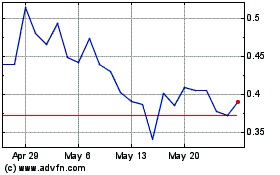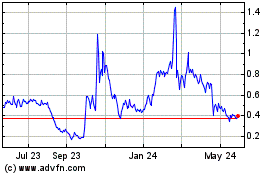FDA Approves Feasibility Study with SeaStar Medical’s Selective Cytopheretic Device in Adults with Cardiorenal Syndrome
14 January 2025 - 12:30AM

SeaStar Medical Holding Corporation (Nasdaq: ICU), a
commercial-stage medical device company developing proprietary
solutions to reduce the consequences of hyperinflammation on vital
organs, announces that the U.S. Food and Drug Administration (FDA)
has approved an investigational device exemption (IDE) application
to evaluate the safety and initial efficacy of SeaStar Medical’s
Selective Cytopheretic Device (SCD-ADULT) in reducing inflammation
in adult patients with acute heart failure with worsening renal
function due to cardiorenal syndrome or severe right ventricular
failure awaiting a left ventricular assist device (LVAD)
implantation.
This feasibility study is expected to enroll 20
patients at up to five clinical sites and will be funded by a
previously announced $3.6 million National Institutes of Health
(NIH) grant awarded to Innovative BioTherapies (IBT), which is led
by SCD inventor H. David Humes, MD, Professor, Division of
Nephrology, Internal Medicine, University of Michigan and SeaStar
Medical Scientific Advisor. Dr. Humes will serve as lead
investigator for the study and SeaStar Medical will act as clinical
research organization (CRO). The FDA’s Center for Biologics
Evaluation and Research (CBER) granted Breakthrough Device
Designation for the SCD in cardiorenal syndrome with LVAD in
September 2023.
“Oftentimes patients with cardiorenal syndrome
and worsening renal or cardiac function are ineligible for
lifesaving LVAD implantation due to the severity of their
condition,” said Kevin Chung, MD, Chief Medical Officer of SeaStar
Medical. “This study is designed to determine whether employing the
SCD-ADULT to reduce hyperinflammation in these extremely ill
patients can sufficiently improve their condition to bridge to LVAD
implantation. Findings from this study could inform a future
pivotal study in this population.”
“We estimate the total addressable U.S. market
for the SCD-ADULT in cardiorenal syndrome at more than $1 billion
annually, making this a significant commercial opportunity for our
company,” said Eric Schlorff, SeaStar Medical CEO. “As acting CRO
for this study, we will receive a portion of the NIH grant while
gaining valuable experience that may serve us well in future
studies.”
About Hyperinflammation
Hyperinflammation is the overproduction or
overactivity of inflammatory cells that can lead to damage of vital
organs. It occurs when the body overproduces inflammatory effector
cells and other molecules that can be toxic or damaging to vital
organs, and result in multi-organ failure and even death. This is
known as the cytokine storm.
Selective Cytopheretic
Device
The Selective Cytopheretic Device (SCD) is a
patented cell-directed extracorporeal device that employs
immunomodulating technology to selectively target proinflammatory
neutrophils and monocytes during continuous renal replacement
therapy (CRRT) and reduces the hyperinflammatory milieu including
the cytokine storm. Unlike pathogen removal and other
blood-purification tools, the SCD is integrated with CRRT
hemofiltration systems to selectively target and transition
proinflammatory monocytes to a reparative state and promote
activated neutrophils to be less inflammatory. This unique
immunomodulation approach may promote long-term organ recovery and
eliminate the need for future renal replacement therapy (RRT),
including dialysis.
In addition to cardiorenal syndrome with LVAD,
the SCD has been awarded FDA Breakthrough Device Designation in the
following indications:
- Adult Acute Kidney Injury
- Hepatorenal Syndrome
- Chronic Dialysis
About Innovative BioTherapies
(IBT)
IBT is a privately held biotechnology company
founded to facilitate the commercialization of technology developed
in Dr. H. David Humes’ academic laboratory. IBT’s research and
development program is primarily supported by federal grants and
contracts that focus on developing cell therapy devices utilizing
human progenitor cells, biomimetic materials and
micro-electromechanical systems (MEMs) technology. More information
is available at http://www.innbio.com/.
About SeaStar Medical
SeaStar Medical is a commercial-stage medical
technology company that is redefining how extracorporeal therapies
may reduce the consequences of excessive inflammation on vital
organs. SeaStar Medical’s novel technologies rely on science and
innovation to provide life-saving solutions to critically ill
patients. The Company is developing and commercializing
cell-directed extracorporeal therapies that target the effector
cells that drive systemic inflammation, causing direct tissue
damage and secreting a range of pro-inflammatory cytokines that
initiate and propagate imbalanced immune responses. For more
information visit www.seastarmedical.com or visit us on
LinkedIn or X.
Forward-Looking Statements
This press release contains certain
forward-looking statements within the meaning of the “safe harbor”
provisions of the Private Securities Litigation Reform Act of 1995.
These forward-looking statements include, without limitation, the
ability of the SCD-ADULT to treat patients with cardiorenal
syndrome or severe right ventricular failure awaiting a LVAD
implantation; the expected patient enrollments and clinical sites
for the feasibility study and other diseases; the expected benefits
of the feasibility study and the total addressable market for the
SCD-ADULT in cardiorenal syndrome. Words such as “believe,”
“project,” “expect,” “anticipate,” “estimate,” “intend,”
“strategy,” “future,” “opportunity,” “plan,” “may,” “should,”
“will,” “would,” “will be,” “will continue,” “will likely result,”
and similar expressions are intended to identify such
forward-looking statements. Forward-looking statements are
predictions, projections and other statements about future events
that are based on current expectations and assumptions and, as a
result, are subject to significant risks and uncertainties that
could cause the actual results to differ materially from the
expected results. Most of these factors are outside SeaStar
Medical’s control and are difficult to predict. Factors that may
cause actual future events to differ materially from the expected
results include, but are not limited to: (i) the risk that SeaStar
Medical may not be able to obtain regulatory approval of its SCD
product candidates; (ii) the risk that SeaStar Medical may not be
able to raise sufficient capital to fund its operations, including
current or future clinical trials; (iii) the risk that SeaStar
Medical and its current and future collaborators are unable to
successfully develop and commercialize its products or services, or
experience significant delays in doing so, including failure to
achieve approval of its products by applicable federal and state
regulators, (iv) the risk that SeaStar Medical may never achieve or
sustain profitability; (v) the risk that SeaStar Medical may not be
able to access funding under existing agreements; (vi) the risk
that third-parties suppliers and manufacturers are not able to
fully and timely meet their obligations, (vii) the risk of product
liability or regulatory lawsuits or proceedings relating to SeaStar
Medical’s products and services, (viii) the risk that SeaStar
Medical is unable to secure or protect its intellectual property,
and (ix) other risks and uncertainties indicated from time to time
in SeaStar Medical’s Annual Report on Form 10-K, including those
under the “Risk Factors” section therein and in SeaStar Medical’s
other filings with the SEC. The foregoing list of factors is not
exhaustive. Forward-looking statements speak only as of the date
they are made. Readers are cautioned not to put undue reliance on
forward-looking statements, and SeaStar Medical assumes no
obligation and does not intend to update or revise these
forward-looking statements, whether as a result of new information,
future events, or otherwise.
Contact:
Alliance Advisors IRJody Cain(310)
691-7100Jcain@allianceadvisors.com
# # #
SeaStar Medical (NASDAQ:ICU)
Historical Stock Chart
From Feb 2025 to Mar 2025

SeaStar Medical (NASDAQ:ICU)
Historical Stock Chart
From Mar 2024 to Mar 2025
